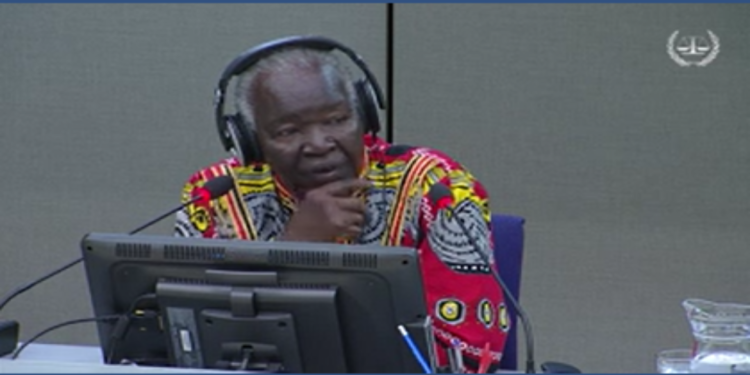By Tom Maliti
An Acholi chief narrated to the International Criminal Court (ICC) how he reprimanded the leader of the Lord’s Resistance Army (LRA), Joseph Kony, for killing his deputy, Vincent Otti, and told Kony he should stop killing his commanders.
Yusuf Okwonga Adek told the court on Tuesday that the delegation he was with thought he was endangering his life. Adek is the first witness to testify in defense of Dominic Ongwen, a former LRA commander, who has been charged with 70 counts of war crimes and crimes against humanity.
He said he berated Kony after Kony gathered all his commanders and told them how and why he killed Otti. He said he and other Acholi leaders were present at that meeting, which Adek said took place in April 2008.
Adek said he asked Kony, “Now you’ve killed Otti, how will you explain to the ICC that you are a good person?”
“I told him point blank, ‘You should stop killing these people in the bush.’ Let the murder of Otti be the last one. Please don’t kill another person,” Adek said.
Adek is the third witness to testify about Otti’s killing during the trial of Ongwen. Adek is the first witness to testify about Kony telling LRA commanders he killed Otti. Two prosecution witnesses have testified about what they knew about Otti’s death. They are P-205 and P-233.
The ICC has an arrest warrant out for Otti, who is widely believed to have been killed in 2007 because of a falling out between him and Kony. Adek said on Tuesday that when Kony spoke with his commanders in April 2008, he told them he killed Otti because Otti had planned to kill him.
Adek was testifying for the second day in the trial of Ongwen, who has been charged for his alleged role in attacks on four camps for internally displaced people (IDP) in northern Uganda. He has also been charged for his alleged role in sexual and gender-based crimes and conscripting child soldiers. Ongwen is alleged to have committed these crimes between July 2002 and December 2005.
Krispus Ayena Odongo, Ongwen’s lead lawyer, asked Adek some questions about Ongwen’s reputation as a commander and what he knew about how fighters in the LRA rose through the ranks. Adek said people rose through the ranks fast in the LRA if they were good fighters.
“We would hear about him (Ongwen) as a very good fighter,” said Adek.
He said Ongwen’s reputation was, “Whenever he goes for a battle he would win.”
Odongo asked him whether Ongwen’s reputation was because he attacked civilians or the Ugandan military.
“When you are recruited were you recruited to attack civilians? You are recruited to fight against your enemies,” answered Adek. He elaborated that in Acholi custom, during war fighters were not supposed to kill women or children or loot food.
“Do I understand, for the benefit of court, that Dominic Ongwen was renowned for being a good fighter against military targets?” asked Odongo.
“That is the same thing I also know,” replied Adek.
Another subject Odongo asked Adek about was how the IDP camps in northern Uganda were established. Adek said President Yoweri Museveni had said the camps were created to protect civilians and keep them away from the battlefield.
“The way he (Museveni) would finish the war (with the LRA) is to collect everyone and put them in the camps and he would speak to the international body to provide people with food,” Adek reported Museveni saying.
“Some places they (the government) actually used force (to get civilians into the camps). They used soldiers and places were bombed,” said Adek.
Odongo also asked Adek about Operation Iron Fist, a Ugandan military push to defeat the LRA in the early 2000s. Odongo asked Adek whether he knew why the operation was initiated. Adek said he believed the operation had the backing of the United States because there were suspicions that the LRA had given refuge to al-Qaeda leader Osman bin Laden after he fell out with the Sudanese government who had hosted him.
“It was suspected that Osman bin Laden was hiding with the LRA. That is the reason why American forces wanted to find out if it is true that Osman bin Laden was hiding with the LRA. That is what actually brought (about) what we call Operation Iron Fist,” said Adek.
He also said that around the same time the relationship between the Sudanese government and Kony had deteriorated. At the time Operation Iron Fist began, Kony was based in LRA rear bases located in the southern part of Sudan. Adek said one reason the relationship deteriorated was the disappearance of Kony’s daughter.
“That daughter of Kony was taken to Khartoum (Sudan’s capital) and never returned and that is the reason why Kony and the Khartoum government parted ways. The daughter vanished forever,” said Adek.
The prosecution will cross-examine Adek when the hearing resumes on Thursday.
This article was first published on the International Justice Monitor website.







